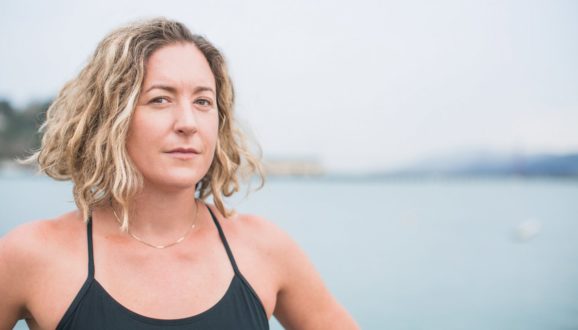These Swimmers Are Challenging Trump’s Immigration Platform
On Cinco de Mayo, a group of swimmers will set out from a beach in San Diego and swim south, landing in Tijuana, in defiance of President Trump’s restrictions and rhetoric on immigration
April 20, 2017

When New Zealander Kim Chambers accepted a casual invitation to the Dolphin Club, a group of swimmers and boaters in San Francisco, in 2009, she was still rehabbing from a devastating fall down a staircase that almost cost her right leg. She wasn’t a serious swimmer, and she had no clue that she would soon fall in love with a torturous adventure sport that would become her life.
In 2014, Chambers became just the sixth person in history (of six total) to achieve the Ocean’s Seven, an aquatic version of the Seven Summits that involves open-water swims across the English Channel, the Catalina Channel (California), the Kaiwi Channel (between Oahu and Molokai), and the North Channel (between Ireland and England), among others. She’s also the only woman ever to swim 30 miles from the Golden Gate Bridge to the jigsaw of rock in the Pacific that is the Farallon Islands, a feat she checked off in 2015. Each feat has provided her a platform to highlight and fundraise for a cause—the Semper Fi Fund, the Navy Seal Foundation, and Warrior Canine Connection—and she’s been careful not to wade directly into politics. Yet the anti-immigrant, anti-refugee legislation spearheaded by President Donald Trump since taking office—and his notorious promise to erect a border wall—has influenced her latest mission: a 10K open water swim across the U.S.-Mexico border.
“There has been so much negativity, and this is an expression of kindness for those that risk death to flee instability, poverty, and war, in search of a better life for themselves and their children,” Chambers says. “Wouldn’t you do anything for your children?”
On the morning of Cinco de Mayo, Chambers and 11 other seasoned marathon swimmers from five countries will launch from picturesque Imperial Beach, the southernmost beach in California, just a few miles from the busiest border crossing in the Western Hemisphere. They’ll swim approximately one kilometer south along the coast, past the border, and land at Playas de Tijuana, roughly two-thirds of a mile into Mexico. On the U.S. side, they’ll be flanked by a crew of American kayakers who will carry the swimmer’s passports; once they cross the border they’ll be escorted by a team of Mexican paddlers along with representatives from the Mexican Navy.
“We want to cast a global spotlight on migration, which is a natural thing,” Chambers says. After being raised on a farm in remote New Zealand, Chambers came to the U.S. to attend University of California, Berkeley. She holds a green card and lives in San Francisco.
There has been so much negativity, and this is an expression of kindness for those that risk death to flee instability, poverty, and war, in search of a better life for themselves and their children.
The idea for the swim was hatched last February over coffee in Marin County with her friend and occasional swim buddy, South African Jean Craven. Last November, they and 26 others swam nine miles across the Dead Sea, from Jordan to Israel, to raise awareness about the sea’s depletion. This time they craved a more visceral topic and, frustrated with the Trump Administration, set their sights on the U.S.-Mexico border, a political lightning rod. “I can’t just stand around and complain. I have to do something,” Chambers says.
Next, Chambers approached another training partner, five-time Ironman Antonio Argüelles, 58, from Mexico City, who has made six of the Ocean’s Seven crossings and is planning to swim the North Channel this summer. If he achieves it, Argüelles will become the first Latin American to bag all seven channels. When he was a boy, Argüelles used to sell Speedo swim caps and goggles at swim meets, and it was a chancemeeting with Speedo executive William Lee, years later, that enabled him to attend Stanford. “My story is one of a kind,” Argüelles said, “but there are people who are not as lucky as I was.”
The team was rounding out. Three Israelis, two South Africans and four Americans, including two-time Catalina Channel finisher, Dan Simonelli, 51, joined up. The group partnered with the Colibrí Center for Human Rights, an organization in Arizona that helps families of those who have gone missing in the borderlands find their loved ones.
The swimmers, however, aren’t interested in promoting policy. “It’s about having empathy for others who are struggling,” said Chambers. “Ignoring human suffering is something that those of us in privileged societies should not allow…I think under certain circumstances migration should be considered a human right.”
